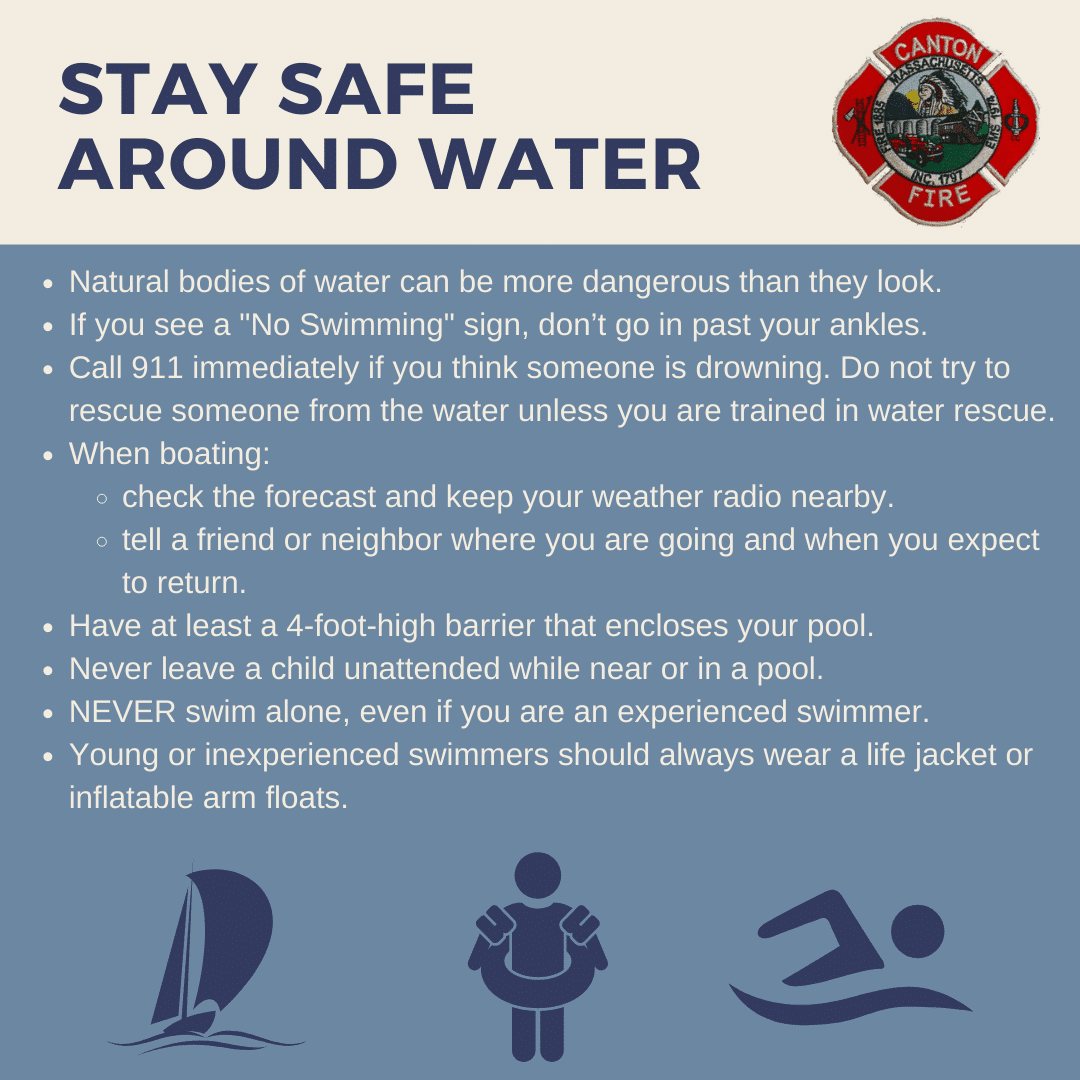CFD shares summer water safety tips
By Canton CitizenChief Charles Doody and the Canton Fire Department would like to remind residents to take safety precautions while in and around bodies of water this summer.
“We encourage all of our residents to review the following safety tips and be cautious when around water this summer,” Chief Doody said. “Natural bodies of water can be especially dangerous with drop-offs, debris, poor visibility and more that can often make swimming in them hazardous. Additionally, if you plan to go into the water, make sure you know how to swim and don’t swim alone.”
Ponds and Lakes
Massachusetts is home to a wide range of lakes, ponds and other natural bodies of water. According to the Department of Public Health, natural bodies of water are more dangerous than they look because there may be:
* Steep drop-offs that can take you by surprise
* Invisible currents that can sweep you away or tire you out
* Tree limbs, plants, rocks and other obstacles that you can get stuck on
* Cold water that can shock your system and impair your ability to react
* More distance to reach an island than you think
* Poor visibility in the water, which can make it hard for you to see where you are and for other people to see you
Stay safe when visiting any natural body of water:
* Look for signs that say “No Swimming.” If you see a sign, don’t go into the water past your ankles.
* Call 911 immediately if you think someone is drowning.
* Do not try to rescue someone from the water unless you are trained in water rescue.
* Ask someone in your group to stay sober, out of the water, and diligent about keeping an eye on the people in the water.
Pool Safety
The American Red Cross reports that more than 200 children drown in swimming pools each year. Additionally, drowning is the number one cause of accidental death for children between the ages of 1 and 4, according to the Centers for Disease Control and Prevention.
* Per Massachusetts regulation, pools should be surrounded by a 4-foot-high barrier that encloses the pool and has an access gate that self-closes, locks and opens outward from the swimming area (even if you don’t have children).
* Fasten a safety cover over the pool when it is not in use, and remove ladders to further prevent access into the pool. Pool alarms are required whenever a house door leads directly to a pool deck.
* Never leave children unattended while they are in or near a pool, and make sure they have an adult to accompany them into the water. Young or inexperienced swimmers should always wear a life jacket or inflatable arm flotation devices.
* Make sure children stay away from pool drains, pipes or any other openings to avoid getting trapped or hurt.
* Set safety instructions and share them with family, friends, neighbors and anyone else who is near or uses the pool. Advise children to stay away from pool deep ends, and to always walk, never run near the pool.
* Take a CPR course for adults and children to be prepared if an emergency situation occurs. Update skills regularly.
* Those who are 21 and older should drink responsibly if they choose to consume alcoholic beverages when by the pool. Overindulging increases the risk for injuries or accidental drowning.
Boating and Beach Safety
While out on a boat, it’s important that everyone wears a life jacket. In 2019, 86% of drowning victims from recreational boating accidents were not wearing a life jacket.
* When you take your family for a boat ride, tell a friend or neighbor where you are going and when you expect to return. If you change plans, let them know.
* Know the rules of the water and practice safe boating. Contact your local Coast Guard auxiliary, power squadron, or Red Cross for details about taking a boating safety course.
* Before you set sail, check the forecast and keep your weather radio with you for updated reports.
* The wind can play tricks on a novice sailor in a small sailboat. The easiest way out of trouble is to let go of the main sheet. This will cock your bow into the wind almost immediately.
* The “man overboard” drill is as important on a small boat as it is on an ocean liner. Learn and practice the proper procedure for retrieving someone who has fallen overboard.
Additionally, the National Weather Service offers the following tips on how to safely enjoy the beach this summer:
* If you are caught in a rip current, stay calm. Don’t fight the current. Escape the current by swimming in a direction following the shoreline. When free of the current, swim at an angle away from the current toward shore.
* Don’t become a victim while trying to help someone else caught in a rip current. Get help from a lifeguard. If a lifeguard isn’t present, yell instructions on how to escape. If possible, throw the rip current victim something that floats.
* If you intend to go into the water, make sure you know how to swim. Never swim alone. For maximum safety, swim near a lifeguard. Be cautious at all times.
* Be aware of the signs of rip currents. Things to look for include a channel of churning choppy water, a difference in water color, a line of seaweed or debris moving out into the lake or a break in the incoming wave pattern.
For more information about boating and beach safety, go to www.weather.gov/mqt/bbtips.
Short URL: https://www.thecantoncitizen.com/?p=75556











